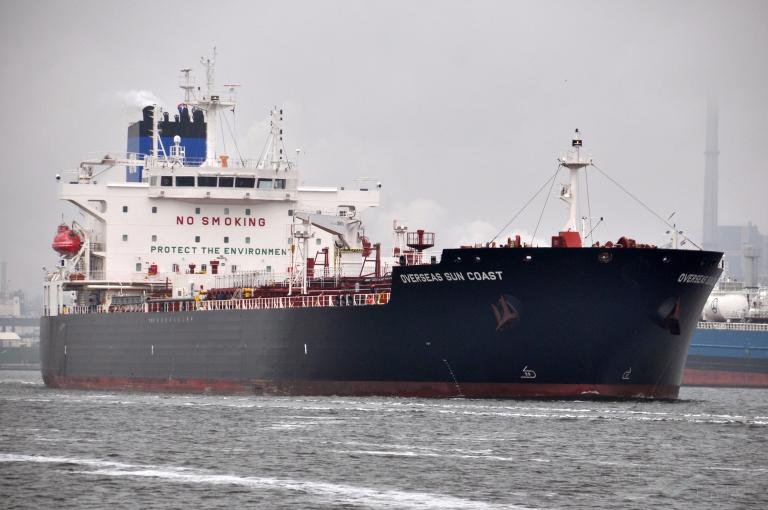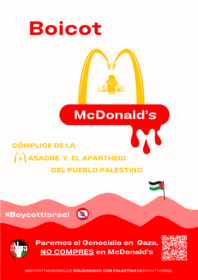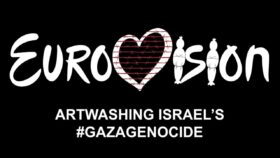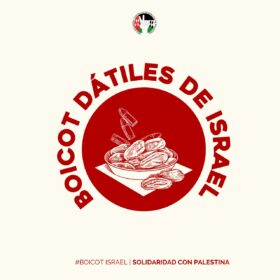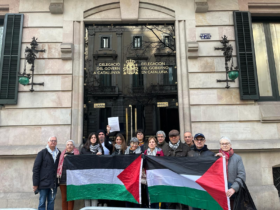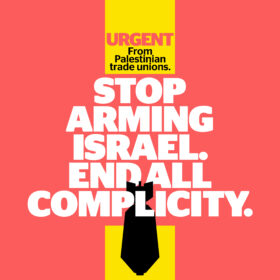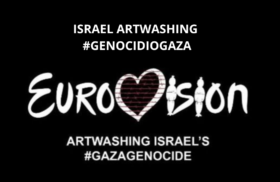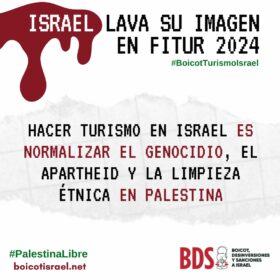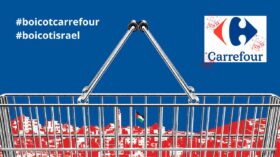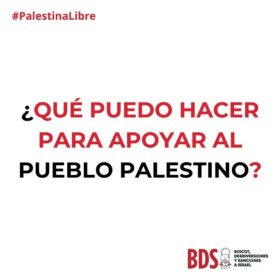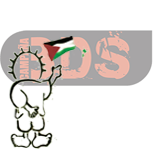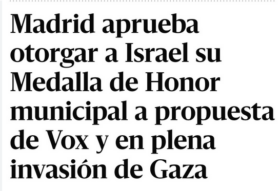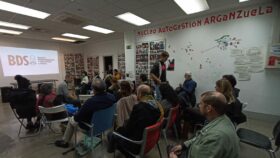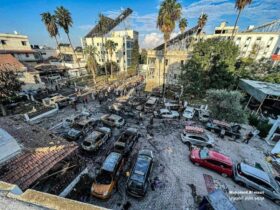[:es]About the slanders published by EL PAÍS against Palestinian solidarity movement[:]
[:es]
RESCOP statement on the slanders against Palestinian solidarity movement published by the newspaper El País
Leer el comunicado de la RESCOP en castellano
The Solidarity Network Against the Occupation of Palestine (RESCOP), which brings together more than 40 NGOs and solidarity groups, has read with astonishment and indignation the article entitled Israel demands explanations from Spain for a Congress they consider to be anti-Semitic, published by El País on January 7th, 2014. In the article, the journalist Ms. Noga Tarnopolsky –whom El País choose to replace the correspondent Mr. Juan Gómez last December– draws attention to a report that the Simon Wiesenthal Center claims to have sent to the Ministry of Foreign Affairs, accusing them of financing anti-Semitic activities.
It is striking that Ms. Tarnopolsky reproduced, without verifying the veracity of information she echoes, the defamatory accusations by Mr. Shimon Samuels, the Director of the Simon Wisentahl Center, allegedly collected in an interview with the newspaper El Pais on the Three Kings day. The RESCOP has actually no evidence that the journalist made any attempt to contact any of the other institutions cited in her article. Neither she seems to have made the effort to check the reliability of her source.
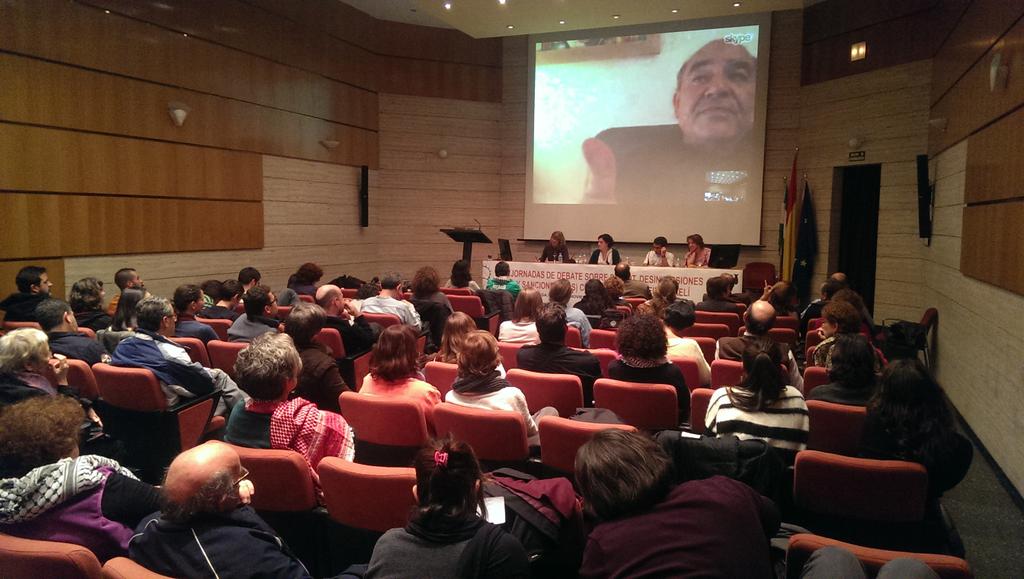
Raji Sourani, Palestinian Center for Human Rights (PCHR), in Málaga / @alqudsandalucia
For all these reasons, the RESCOP want to state the following:
- Contrary to what the article by Ms. Tarnopolsky erroneously reports, none of the aforementioned activities benefited from funding from the AECID and the Ministry of Foreign Affairs.
- The statement that the three mentioned events were part of the same conference or activity is also incorrect. While the Conference on BDS was held in Málaga, the Conference of Local Authorities was held at the Andalusian Parliament in Seville, and photos on the Apartheid Wall were exhibited at the Autonomous University of Madrid. The dates coincide as November 29th is the International Day of Solidarity with the Palestinian People and 2014 was declared by the UN the International Year of Solidarity with the Palestinian People; however, they were not organized by the same institutions. None of these three activities had racist or anti-Semitic content.
- The days of debate on the Boycott, Divestment and Sanctions campaign against Israeli Apartheid were co-organized on November28th and 29th, 2014 in Malaga by the Al-Quds Association and the Andalusian International Cooperation Agency for Development (AACID) in collaboration with the Solidarity Network Against the Occupation of Palestine (RESCOP). The International Jewish Anti-Zionist Network and the Israeli-Palestinian association Alternative Information Centre also attended, as well as recognized defenders of human rights and experts in international law, such as Mr. David Bondía, Ms. Luciana Cocconi, Mr. Carlos Slepoy, Ms. Teresa Aranguren, Mr. Raji Sourani, etc. Israeli citizen Mr. Sergio Yahni made a detailed presentation of Israeli laws that discriminate against Palestinian citizens in Israel, and of the racist drift of the Israeli government over the last few months.
- The organizers recorded the whole Conference in Málaga and they might prove to a Spanish Court, if necessary, that there was no apology for any racist ideology, and that the Simon Wiesenthal Center’s defamatory accusations are only looking to discredit their organizers and curtail the freedom of expression and association of the Palestine solidarity movement. All information is available on the conference website: jornadasbdsmalaga.weebly.com.
- The seal Israeli Apartheid-free Space [in Spanish, Espacio Libre de Apartheid Israelí] is part of the BDS campaign and aims to end our direct and indirect complicity with Israel war crimes committed in Palestine through cooperation and trade with Israeli institutions. The Boycott, Divestment and Sanctions campaign against Israeli Apartheid is a global, public, and peaceful campaign, based on international humanitarian law and human rights. Comparing it with the policies of Nazi Germany is not only a gross manipulation and hateful insult: it is a slander that hurts the memory of Holocaust victims and their survivors, many of whom didn’t hesitate to support the BDS campaign. Furthermore, the accusation of anti-Semitism tries to ignore that the Arab peoples, including the Palestinian people, are also Semites.
- The Simon Wiesenthal Center is a pro-Israel lobby group that regularly accuses of anti-Semitism all entities, political parties, journalists, etc. who are critical of the colonial policies of the Israeli state. Its defamatory practices were exposed on several occasions, and including drafted by the Argentinean Jewish historian Mr. Ruben Kotler.
- In November 2013, a French Court acquitted a group of BDS movement activists «accused» of participating in actions of boycott against Israeli products in Carrefour stores. The French justice system considered that the Boycott, Divestment and Sanctions campaign against Israeli Apartheid is not a discriminatory act and that its activities are completely legal.
- In November 2014, the French Jewish organization CRIF was condemned by the highest French Court in a defamation suit filed by the organization Committee of Charity and Assistance to the Palestinian people. The CRIF had published an article by Mr. Marc Knobel, Director of Studies of the Simon Wiesenthal Center, wherein he accused the NGO of raising funds for the political organization Hamas.
Recalling that the right to receive truthful information and the right to honor and reputation are rights constitutionally protected, we require El País to publish the reversal for the information intentionally manipulated contained in its article dated January 7th, 2015.
The Solidarity Network Against the Occupation of Palestine also invites El País, its journalists and the other media of the State to join the Israeli Apartheid-free Space campaign, following what the Andalusian Union of Journalists and the Community Media Network already did.
The ‘anti-Semitic’ conference that really wasn’t such
By Lola Galán, Press Ombudswoman of EL PAÍS, January 13th, 2015:
La conferencia ‘antisemita’ que no fue tal
The Arab-Israeli conflict is one of the most bitter and difficult to approach by the media. It has brought death, destruction and hatreds that seem, however, indestructible. Any information that refers to this conflict, although tangentially, must observe the highest standards of journalistic rigor, which demands to seek the views of all parties mentioned in any article published. It was not so in a news published by this newspaper in its website on January 6th, and in the print edition the following day, under the title: Israel demands explanations from Spain for a Congress they consider to be anti-Semitic.
The article by the correspondent for this newspaper in Jerusalem, Ms. Noga Tarnopolsky, stated in the summary: The Simon Wiesenthal Center maintains in a report that the [Spanish] Ministry of Foreign Affairs indirectly funded a congress considered condemnatory of Jewish people. In her article the journalist referred to a report released a day earlier by the Wiesenthal Center, according to which «the Spanish Agency for International Development Cooperation (AECID), an organ that depends by the Ministry of Foreign Affairs, funded a conference which allegedly called to a generic international boycott of the entire State of Israel, the demonization of Israeli leaders and violence against Jews people”.
Harsh sentences, reaffirmed by the Coordinator of the report and Director of International Relations of the Wiesenthal Center, Mr. Shimon Samuels, who the journalist interviewed. The Israeli government also agreed on condemning the Spanish Government, assuming as true the allegation of the Jewish institution, well-known for having tirelessly pursued Nazi criminals.
The event that caused the reactions of the Wiesenthal Center was, according to the column of EL PAÍS correspondent, a so-called International Conference of Local Governments and Civil Society Organizations in Support of Palestinian Rights, held in Malaga and Seville in early December. Within the same set of events, an exhibition on Palestine which supposedly featured a map of Israel with a swastika painted over, was also mentioned. EL PAÍS didn’t offer, in the article, the Spanish Foreign Ministry’s view, as is required, nor the opinion of the sponsor organizations of the criticized conference. It is true that repeated attempts were made to locate a government spokesman, but not the spokespersons of these organizations.
The next day, EL PAÍS published a report by the diplomatic correspondent Mr. Miguel González, under the title: Spanish government rejects claims it financed antisemitic conference; in the article, the Secretary of State for International Cooperation and Latin America, Jesús Gracia, refuted the main accusation of Israel and the Wiesenthal Center that the Spanish Government had funded anti-Jewish acts, and described it as «intolerable». The same page also presented the views of two of the organizations that promoted the acts condemned by Israel. Both the Andalusian Fund of Municipalities for International Solidarity (FAMSI) and the Al-Quds Association for Solidarity with the Peoples of the Arab World flatly denied that such events have had an anti-Semitic nature.
However, the information was not sufficiently comprehensive to consider closed the case, which had filled my mailbox with protest messages; I read them upon returning to work after the Christmas holidays and, for that reason, I decided to approach the case in this blog.
I will refer especially to the largest reversal that I’ve received, because it provides data that this press ombdusmen could then confirm as true. This is the statement of the Solidarity Network Against the Occupation of Palestine (RESCOP), which brings together some 40 NGOs of similar nature. It flatly rejects «the defamatory allegations» by the director of the Wiesenthal Center and states, among other things, the following:
“Contrary to what the article by Ms. [Noga] Tarnopolsky erroneously reports, none of the aforementioned activities benefited from funding from the AECID and the Ministry of Foreign Affairs.
“The statement that the three mentioned events were part of the same conference or activity is also incorrect. While the Conference on BDS was held in Malaga, the Conference of local authorities was held at the Andalusian Parliament in Seville, and photos on the Apartheid Wall were exhibited at the Autonomous University of Madrid. The dates coincide as November 29th is the International Day of Solidarity with the Palestinian People and 2014 was declared by the UN the International Year of Solidarity with the Palestinian People; however they were not organized by the same institutions. None of these three activities had racist or anti-Semitic content».
“The days of debate on the Boycott, Divestment and Sanctions campaign against Israeli Apartheid were co-organized on November28th and 29th, 2014 in Malaga by the Al-Quds Association and the Andalusian International Cooperation Agency for Development (AACID) in collaboration with the Solidarity Network Against the Occupation of Palestine (RESCOP). The International Jewish Anti-Zionist Network and the Israeli-Palestinian association Alternative Information Centre also attended, as well as recognized defenders of human rights and experts in international law”.
“The organizers” the statement adds, “recorded the whole Malaga Conference and they might prove to a Spanish Court, if necessary, that there was no apology for any racist ideology, and that Simon Wiesenthal Center’s defamatory accusations are only looking to discredit their organizers and curtail the freedom of expression and association of the Palestine solidarity movement”. The statement contains a direction where the information about those days /the event is available: http://jornadasbdsmalaga.weebly.com.
I would further like to mention, at least briefly, other letters of protest offering similar arguments, such as the one by: Mr. Javier Barquin, who present himself as a member of Amnesty International and participant in one of the round tables organized in the frame of the mentioned events; Ms. María José Lera, professor at the University of Seville; Mr. Santiago González Vallejo, of the Committee in Solidarity with the Arab Cause; or Ms. Marina Delgado Romero, who specifies that the ‘Boycott, Divestment and Sanctions’ (BDS) against Israeli apartheid is a global campaign, «which pursues three objectives based on strict compliance with international law: the end of Israel’s occupation and colonization of Arab territories; the end of Israeli apartheid on Palestinians; and the right of return of all Palestinian refugees to their lands. The BDS campaign is not an anti-Semitic campaign. It doesn’t discriminate against any group because of its religious, ethnic, cultural, linguistic or national identity».
Ms. Delgado Romero also insists that «it is not a racist campaign, by contrast, it seeks to end discrimination and racism. Jewish organizations such as Jewish Voice for Peace, International Jewish Anti-Zionist Network or Boycott from Within (Israeli boycotting the Jewish state inside Israel) are part of it».
I spoke on the phone with Ms. Noga Tarnopolsky, who explained to me that she didn’t contact any of these organizations because the object of her article were not the events themselves, but the fact that the Spanish Government had funded them. To this explanation she added by email the following:
«EL PAÍS cited a report published by the Wiesenthal Center, which is an internationally recognized source, frequently quoted by the media worldwide.
Our note focused on the news that the Wiesenthal Center affirms, in its report, that the Spanish government has provided indirect financial support to activities that are of a militant and anti-Israeli nature. EL PAÍS repeatedly asked the reaction of the Spanish Ministry of Foreign Affairs. It also requested and published the reaction of the Israeli government.
EL PAÍS did not classify the events, it only quoted other people expressing that, according to them, certain events were anti-Israeli or anti-Semitic».
The fact that Ms. Tarnospolsky doesn’t qualify in her own words the conference object of criticism, while, as she indicates, she merely quotes phrases of others, does not diminish the responsibility of the author, nor of the newspaper that published his article. Spreading accusations without listening to the defendants is contrary to the Style Guide which points to the need, especially in controversial cases, to obtain the views of all parties to the dispute.
On the other hand, the journalist did seek the views of both the Government of Israel and of a UN spokesman; one of the UN agency was in fact among the organizers of the different events, as a series of activities and not a unique conference took place, including roundtables, conferences and debates with the problems of Palestine as a backdrop. Ms. Tarnopolsky also provides specifics of the exhibition organized by the Faculty of Economics and Business Studies at the Autonomous University of Madrid. I think it was very important to collect at least the views of participants and organizers of the acts criticized by the Wiesenthal Center.
I have contacted the Autonomous University for details of the exhibition in which, according to Ms. Noga Tarnopolsky, a swastika appeared on the map of Israel. It is an exhibition organized by the NGO Sodepaz (EL PAÍS informed of this in the article by Miguel Gonzalez, although it didn’t approach its content), held between November 24th and 29th in the framework of the XI Week of Solidarity, and, according to sources in the University, «with no links with the International Conference of Local Governments and Civil society Organizations in Support of Palestine». I visited the exhibition website where you can see a piece by a Palestinian artist named Na ‘eem Ismail, in which the map of Israel crossed by four thick arrows drawn in red color appears. It’s not a swastika and cannot be confused with the Nazi symbol in any way.
I think that the newspaper acted improperly publishing the news of the correspondent in Jerusalem without proper checks, causing a justified discomfort among all the aforementioned parties who were not consulted. Although urgency is part of journalistic work, the complaint by the Simon Wiesenthal Center, endorsed by the Israeli diplomacy, was a story that could have waited one day, allowing the newspaper to provide complete information to their readers. It is true that the error was partially corrected the following day, with the second article, but that did not stop the adverse impact of the information previously given. This second information, which mainly focused on the Ministry of Foreign Affairs’ response, didn’t give enough voice to all those mentioned in the first article.[:]
Share this content:

